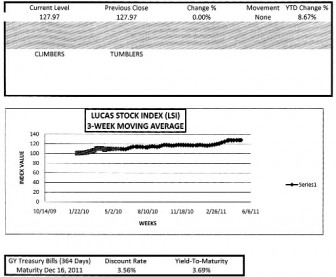Exemption
Everyone likes to receive good news and Guyanese might believe that they got some in the 2011 budget. It might be recalled that the administration made several disclosures about taxes in the budget speech delivered a few months ago by the Minister of Finance. Not all of the tax news was about the business community. In addition to lowering the corporate and company tax rates, individual Guyanese were offered something in the tax package as well. The administration announced an increase in the amount of personal income that would be exempted from the imposition of taxes. The monthly tax exemption threshold was raised from G$35,000 to G$40,000. On the face of it, the decision to raise the tax threshold looks very good and appears to offer relief and benefits to all Guyanese. That is so until Guyanese realize how insignificant the increase really is; something that they have probably figured out by now with the way prices of food and local transportation have gone up within the last two months.
Initial Cost

There are potential economic benefits to the Guyana economy from the decision to leave more money in the hands of Guyanese consumers. With consumption spending accounting for over 50 percent of gross domestic product (GDP), the additional G$3 billion of tax relief could add another G$1.5 billion to the economy, and create a few hundred low-income jobs, if all the extra money was spent. Even though the initial cost to the administration would be the G$3 billion of lost revenue, it can expect to recover a portion of that cost through the value-added tax (VAT). Considering that 2011 is an election year, it is hard to believe that the fiscal maneuver of the administration was limited to motives of benevolence and altruism. The Presidential candidate of the PPP/C has already made reference to the increase in the exemption limits thereby raising speculation that the decision also had something to do with the upcoming general elections in Guyana. The competing utility of the decision to raise the personal income tax exemption level must make Guyanese wonder if the tax change is a gift or a gimmick.
Inconsequential
There are other reasons to wonder about the motive of the decision, especially since the income change appears to be inconsequential at the personal level across almost all income levels. First, the tax concession changes nothing for those workers whose income is below G$35,000. If those workers are struggling now, then they will continue to struggle despite the new threshold. Many of the workers in this category are members of the public sector who earn the minimum wage of G$33,000 and less. Their situation will remain irrelevant for another four years, especially since the administration has made it clear that it prefers wage increases of no more than five percent at a time. This rigid disregard for the economic plight of Guyanese workers is typified by the harsh attitude of the administration towards the sugar workers. They too have been maltreated by this administration. If the administration could ignore the plight of its own employees, why would it not ignore that of others?
Small Mercies
Second, even those Guyanese who will get some relief from the adjustment in the exemption level will discover that all that glitters is not gold. Guyanese who are making over G$35,000 per month will be taking home additional income ranging from G$400 to G$20,000 per year. It is not for me to tell hardworking Guyanese not to be grateful for small mercies, but it would not hurt either to point out that the tax change was not intended to ease their economic suffering. This is obvious by looking at the G$400 of additional income that would accrue to those who are making just above G$35,000. The additional income is equivalent to G$33 per month. In a month of 21 working days, that turns out to be G$1.58 per day. Despite their gratitude, a family receiving this little relief would not even be able to put an extra loaf of bread on the table.
Insufficient
Things appear different as income gets closer to the exemption threshold and beyond. However, even those families receiving the larger amount of G$20,000 per year would discover severe limits to their expectations. The additional income translates into G$1,666 per month and in a month with 21 working days, the relief amounts to G$79 per day. Apart from being insufficient to buy a loaf of bread, this increase is still one dollar short of a one-way minibus fare for someone travelling to work in Georgetown from “South”. As useful as it is, the supposed relief provides no opportunity for that worker to get back home.
As obvious as it might be, the difficulties of all workers are compounded by the constant pressure from inflation. Over the last five years, inflation averaged about seven percent per year while wages grew at an average rate of five percent. At its maximum, the increase from the tax change represents about a four percent boost in income. This change helps to bring the income of some workers level with the changes in inflation over the last five years. The group likely to benefit is that containing the 38,000 individuals cited in the budget or 15 percent of workers. This leaves the vast majority of workers, 85 percent, struggling to catch up with inflation that spanned the last five years.
Cynical View
The foregoing observations suggest that the administration has a very cynical view of the economic plight of Guyanese and very little motivation to remedy it. The calculation of the PPP/C is that Guyanese would only be interested in the short-term psychological boost generated by the illusion of extra money and not in their long-term welfare. It is betting on Guyanese ignoring their long economic suffering to date and only seeing the chimera of goodwill transported by the tax changes. Such confidence might just be misplaced as Guyanese discover the truth about the utility of the relief that accompanies the adjustments to the tax exemption threshold.









